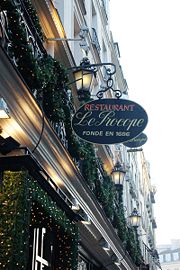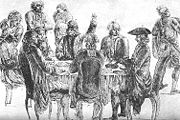
Café Procope
Encyclopedia

Restaurant
A restaurant is an establishment which prepares and serves food and drink to customers in return for money. Meals are generally served and eaten on premises, but many restaurants also offer take-out and food delivery services...
of Paris in continuous operation. It was opened in 1694 by the Sicilian
Sicily
Sicily is a region of Italy, and is the largest island in the Mediterranean Sea. Along with the surrounding minor islands, it constitutes an autonomous region of Italy, the Regione Autonoma Siciliana Sicily has a rich and unique culture, especially with regard to the arts, music, literature,...
Francesco Procopio dei Coltelli, with a slyly subversive name adopted from the historian Procopius
Procopius
Procopius of Caesarea was a prominent Byzantine scholar from Palestine. Accompanying the general Belisarius in the wars of the Emperor Justinian I, he became the principal historian of the 6th century, writing the Wars of Justinian, the Buildings of Justinian and the celebrated Secret History...
, whose Secret History, the Anekdota, long known of, had been discovered in the Vatican Library and published for the first time ever in 1623: it told the scandals of Emperor Justinian, his ex-dancer Empress, and his court.
History
Café Procope, in the street then known as rue des Fossés-Saint-Germain-des-Prés, started as a caféCafé
A café , also spelled cafe, in most countries refers to an establishment which focuses on serving coffee, like an American coffeehouse. In the United States, it may refer to an informal restaurant, offering a range of hot meals and made-to-order sandwiches...
where gentlemen of fashion might drink coffee
Coffee
Coffee is a brewed beverage with a dark,init brooo acidic flavor prepared from the roasted seeds of the coffee plant, colloquially called coffee beans. The beans are found in coffee cherries, which grow on trees cultivated in over 70 countries, primarily in equatorial Latin America, Southeast Asia,...
, the exotic beverage that had previously been served in taverns, or eat a sorbet, served up in porcelain
Porcelain
Porcelain is a ceramic material made by heating raw materials, generally including clay in the form of kaolin, in a kiln to temperatures between and...
cups by waiters in exotic "Turkish" garb. The escorted ladies who appeared at Café Procope in its earliest days soon disappeared. In 1689 the Comédie française was established across the street— hence the street's modern name— and the Procope became known as the "theatrical" café, and remained so: it was to the Procope on 18 December 1752 that Rousseau
Jean-Jacques Rousseau
Jean-Jacques Rousseau was a Genevan philosopher, writer, and composer of 18th-century Romanticism. His political philosophy influenced the French Revolution as well as the overall development of modern political, sociological and educational thought.His novel Émile: or, On Education is a treatise...
retired before the performance of his last play Narcisse had even finished, all too aware, now that he had seen it mounted, he said publicly, how boring it all was on the stage.

Throughout the 18th century, the brasserie
Brasserie
In France and the Francophone world, a brasserie is a type of French restaurant with a relaxed, upscale setting, which serves single dishes and other meals. The word 'brasserie' is also French for "brewery" and, by extension, "the brewing business"...
Procope was the meeting place of the intellectual establishment, and of the nouvellistes of the scandal-gossip trade, whose remarks at Procope were repeated in the police reports. Not all the Encyclopédistes
Encyclopédie
Encyclopédie, ou dictionnaire raisonné des sciences, des arts et des métiers was a general encyclopedia published in France between 1751 and 1772, with later supplements, revised editions, and translations. It was edited by Denis Diderot and Jean le Rond d'Alembert...
drank forty cups of coffee a day like Voltaire
Voltaire
François-Marie Arouet , better known by the pen name Voltaire , was a French Enlightenment writer, historian and philosopher famous for his wit and for his advocacy of civil liberties, including freedom of religion, free trade and separation of church and state...
, who mixed his with chocolate, but they all met at Procope, as did Benjamin Franklin
Benjamin Franklin
Dr. Benjamin Franklin was one of the Founding Fathers of the United States. A noted polymath, Franklin was a leading author, printer, political theorist, politician, postmaster, scientist, musician, inventor, satirist, civic activist, statesman, and diplomat...
, John Paul Jones
John Paul Jones
John Paul Jones was a Scottish sailor and the United States' first well-known naval fighter in the American Revolutionary War. Although he made enemies among America's political elites, his actions in British waters during the Revolution earned him an international reputation which persists to...
and Thomas Jefferson
Thomas Jefferson
Thomas Jefferson was the principal author of the United States Declaration of Independence and the Statute of Virginia for Religious Freedom , the third President of the United States and founder of the University of Virginia...
.

Alain-René Lesage
Alain-René Lesage was a French novelist and playwright. Lesage is best known for his comic novel The Devil upon Two Sticks , his comedy Turcaret , and his picaresque novel Gil Blas .-Youth and education:Claude Lesage, the father of the novelist, held the united...
described the hubbub at Procope in La Valise Trouvée (1772): "There is an ebb and flow of all conditions of men, nobles and cooks, wits and sots, pell mell, all chattering in full chorus to their heart's content." In the increasingly democratic mix it will be noted there were still no women. Writing a few years after the death of Voltaire, Louis-Sébastien Mercier
Louis-Sébastien Mercier
Louis-Sébastien Mercier was a French dramatist and writer.-Early life and education:He was born in Paris to a humble family: his father was a skilled artisan who polished swords and metal arms. Mercier nevertheless received a decent education.-Literary career:Mercier began his literary career by...
noted:
During the Revolution, the Phrygian cap
Phrygian cap
The Phrygian cap is a soft conical cap with the top pulled forward, associated in antiquity with the inhabitants of Phrygia, a region of central Anatolia. In the western provinces of the Roman Empire it came to signify freedom and the pursuit of liberty, perhaps through a confusion with the pileus,...
, soon to be the symbol of Liberty, was first displayed at the Procope; the Cordeliers
Cordeliers
The Cordeliers, also known as the Club of the Cordeliers, Cordeliers Club, or Club des Cordeliers and formally as the Society of the Friends of the Rights of Man and of the Citizen , was a populist club during the French Revolution.-History:The club had its origins in the Cordeliers district, a...
, Robespierre, Danton
Georges Danton
Georges Jacques Danton was leading figure in the early stages of the French Revolution and the first President of the Committee of Public Safety. Danton's role in the onset of the Revolution has been disputed; many historians describe him as "the chief force in theoverthrow of the monarchy and the...
and Marat
Jean-Paul Marat
Jean-Paul Marat , born in the Principality of Neuchâtel, was a physician, political theorist, and scientist best known for his career in France as a radical journalist and politician during the French Revolution...
all used the cafe as a meeting place. After the Restoration, another famous customer was Alexander von Humboldt
Alexander von Humboldt
Friedrich Wilhelm Heinrich Alexander Freiherr von Humboldt was a German naturalist and explorer, and the younger brother of the Prussian minister, philosopher and linguist Wilhelm von Humboldt...
, who lunched here during the 1820s every day from 11am to noon. The Procope retained its literary cachet: Alfred de Musset
Alfred de Musset
Alfred Louis Charles de Musset-Pathay was a French dramatist, poet, and novelist.Along with his poetry, he is known for writing La Confession d'un enfant du siècle from 1836.-Biography:Musset was born on 11 December 1810 in Paris...
, George Sand
George Sand
Amantine Lucile Aurore Dupin, later Baroness Dudevant , best known by her pseudonym George Sand , was a French novelist and memoirist.-Life:...
, Gustave Planche, the philosopher Pierre Leroux
Pierre Leroux
Pierre Henri Leroux , French philosopher and political economist, was born at Bercy, now a part of Paris, the son of an artisan.- Life :...
, M. Coquille, editor of Le Monde
Le Monde
Le Monde is a French daily evening newspaper owned by La Vie-Le Monde Group and edited in Paris. It is one of two French newspapers of record, and has generally been well respected since its first edition under founder Hubert Beuve-Méry on 19 December 1944...
, Anatole France
Anatole France
Anatole France , born François-Anatole Thibault, , was a French poet, journalist, and novelist. He was born in Paris, and died in Saint-Cyr-sur-Loire. He was a successful novelist, with several best-sellers. Ironic and skeptical, he was considered in his day the ideal French man of letters...
were all regulars. Under the Second Empire, August Jean-Marie Vermorel
August Jean-Marie Vermorel
August Jean-Marie Vermorel was a French journalist.He was born at Denice.A radical and socialist, he was attached to the staff of the Presse and the Liberte . In the latter year he was appointed editor of the Courrier Français, and his attacks on the government in that organ led to his...
of Le Reforme or Léon Gambetta
Léon Gambetta
Léon Gambetta was a French statesman prominent after the Franco-Prussian War.-Youth and education:He is said to have inherited his vigour and eloquence from his father, a Genovese grocer who had married a Frenchwoman named Massabie. At the age of fifteen, Gambetta lost the sight of his right eye...
would expound their plans for social reform.
Café Procope was refurbished in 1988 to 1989 in 18th-century style. It received Pompeian red walls, crystal chandeliers, 18th century oval portraits of famous people that have been patrons, and a tinkly piano. The waiters were dressed in quasi-revolutionary uniforms.

